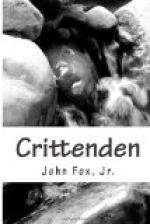There was no name signed. The initials were J. P., and Crittenden looked up inquiringly.
“His name was not Blackford; it was Page—Jack Page. He was my cousin,” she went on, gently. “That is why I never told you. It all happened while you were at college. While you were here, he was usually out West; and people thought we were merely cousins, and that I was weaning him from his unhappy ways. I was young and foolish, but I had—you know the rest.”
The tears gathered in her eyes.
“God pity him!”
Crittenden turned from her and walked to and fro, and Judith rose and walked up to him, looking him in the eyes.
“No, dear,” she said; “I am sorry for him now—sorry, so sorry! I wish I could have helped him more. That is all. It has all gone—long ago. It never was. I did not know until I left you here at the stiles that night.”
Crittenden looked inquiringly into her eyes before he stooped to kiss her. She answered his look.
“Yes,” she said simply; “when I sent him away.”
Crittenden’s conscience smote him sharply. What right had he to ask such a question—even with a look?
“Come, dear,” he said; “I want to tell you all—now.”
But Judith stopped him with a gesture.
“Is there anything that may cross your life hereafter—or mine?”
“No, thank God; no!”
Judith put her finger on his lips.
“I don’t want to know.”
* * * * *
And God was good that Christmas.
The day was snapping cold, and just a fortnight before Christmas eve. There had been a heavy storm of wind and sleet the night before, and the negroes of Canewood, headed by Bob and Uncle Ephraim, were searching the woods for the biggest fallen oak they could find. The frozen grass was strewn with wrenched limbs, and here and there was an ash or a sugar-tree splintered and prostrate, but wily Uncle Ephraim was looking for a yule-log that would burn slowly and burn long; for as long as the log burned, just that long lasted the holiday of every darky on the place. So the search was careful, and lasted till a yell rose from Bob under a cliff by the side of the creek—a yell of triumph that sent the negroes in a rush toward him. Bob stood on the torn and twisted roots of a great oak that wind and ice had tugged from its creek-washed roots and stretched parallel with the water—every tooth showing delight in his find. With the cries and laughter of children, two boys sprang upon the tree with axes, but Bob waved them back.
“Go back an’ git dat cross-cut saw!” he said.
Bob, as ex-warrior, took precedence even of his elders now.
“Fool niggers don’t seem to know dar’ll be mo’ wood to burn if we don’t waste de chips!”
The wisdom of this was clear, and, in a few minutes, the long-toothed saw was singing through the tough bark of the old monarch—a darky at each end of it, the tip of his tongue in the corner of his mouth, the muscles of each powerful arm playing like cords of elastic steel under its black skin—the sawyers, each time with a mighty grunt, drew the shining, whistling blade to and fro to the handle. Presently they began to sing—improvising:




